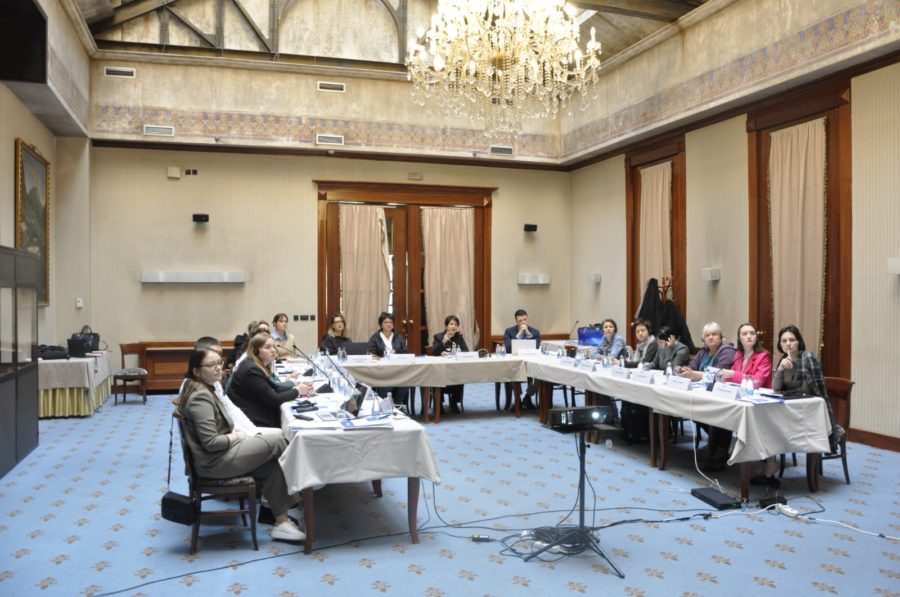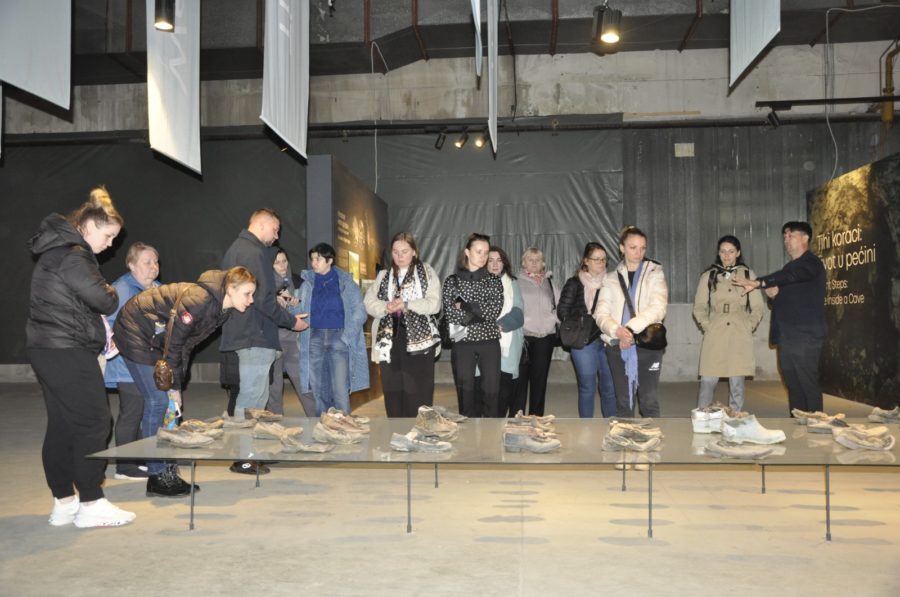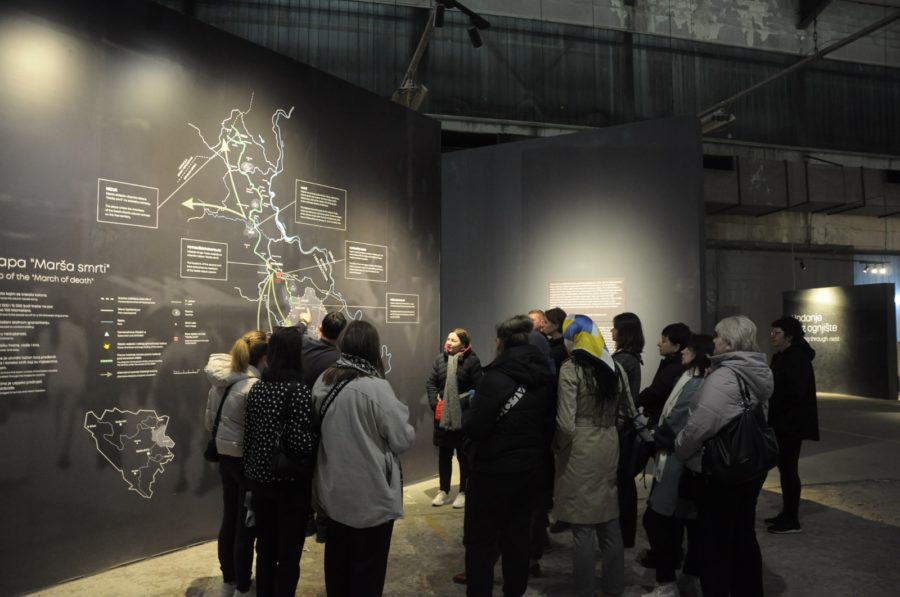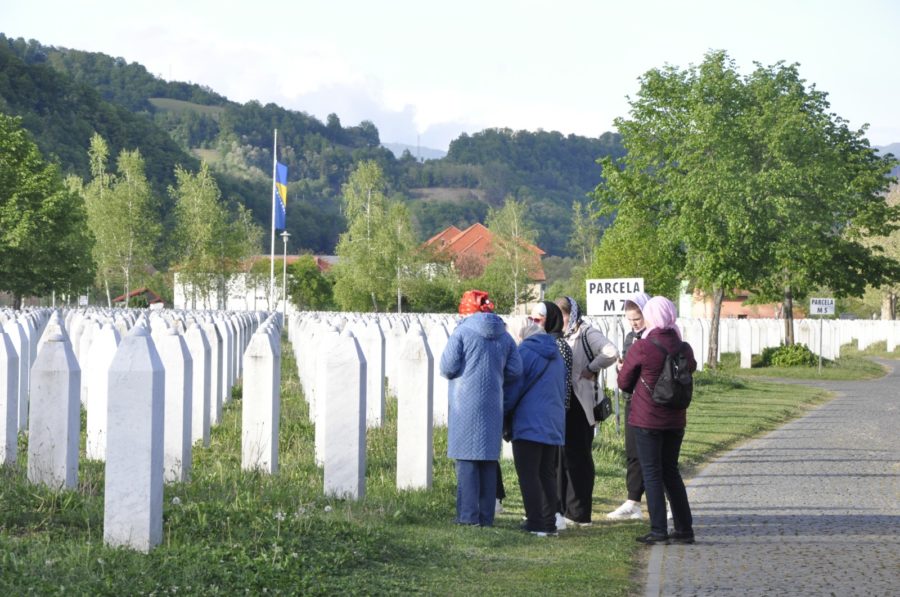Ukrainian human rights defenders and families of missing persons visited Bosnia and Herzegovina to exchange experience in searching for missing persons
On April 20-27, 2024, representatives of Ukrainian human rights organisations and family members of the families of the missing persons visited Bosnia and Herzegovina. This trip was important for sharing experiences. The event was organised by the International Commission on Missing Persons (ICMP). Elina Sulima, journalist of Human Rights Centre ZMINA, was also among the members of the delegation.
 Meeting of Ukrainian organisations with representatives of ICMP in the Western Balkans
Meeting of Ukrainian organisations with representatives of ICMP in the Western BalkansDuring the conversation with ICMP representatives and family members of the missing persons, Ukrainians learned new facts about crimes committed during the war in Bosnia and Herzegovina.
The war in Bosnia and Herzegovina lasted from 1992 to 1995. It was attended by Serbs, Croats and Bosniaks – representatives of the three ethnic groups that lived in the country at that time. About 100,000 people died during the hostilities, and another 2.2 million became IDPs or refugees. Currently, about 40,000 people, both military and civilian, are considered missing.
The four-year conflict ended with the signing of the Dayton Agreement. Thanks to it, the parties were able to exchange prisoners, but still did not solve the issue of missing persons.
Dissatisfied with the results of the agreements, the members of the families of the victims staged mass protests: they blocked traffic on highways, overturned cars, and threw stones at houses. With such aggressive actions, they wanted to force the state, the International Committee of the Red Cross and the international community to listen to their demands. It was they who became the driving force that allowed the process of searching for missing persons to be launched in Bosnia. And it was thanks to their efforts that testimonies and information about those events were collected.
 Srebrenica Memorial Center
Srebrenica Memorial CenterFamilies that united in communities were involved in the development of important draft laws. This made it possible to establish an independent Institute of Missing Persons, adopt the relevant law and create ICMP. The latter appeared during the G7 summit in 1996.
The main task of ICMP is to provide assistance in the search for missing persons, as well as to defend the rights of their families. The organisation contributes to solving a number of problems, but all responsibility for finding people is the responsibility of a specific state. In Bosnia and Herzegovina ICMP achieved the adoption of the Law “On missing persons and their family members”, the registration of missing persons and the creation of the corresponding Institute.
Following Bosnia’s example, other Balkan countries also changed their legislation and created similar institutions. This is how interstate cooperation on the exchange of information about missing people began. Thanks to this, it was possible to find and identify 75% of the missing. Most of them (16,000) were able to be identified with the help of DNA expertise – a revolutionary technology that replaced the classic method of identification by clothes and things. Every year, this technology is improved, allowing to examine even complex remains of bodies.
Despite the end of the war in Bosnia, the search for mass graves of the tortured is still ongoing. Law enforcement officers are still finding the remains of people killed during the war. However, their search is complicated by the fact that over time the terrain changes beyond recognition, and it becomes increasingly difficult for witnesses of those events to determine the location of the graves. Because of this, about 11,000 people are still considered missing.
 Srebrenica Memorial Center
Srebrenica Memorial CenterMembers of the Ukrainian delegation visited the Srebrenica Memorial Center, where they learned about the ethnic cleansing of Muslims carried out by Serbian paramilitary groups under the command of Radko Mladych. Then, in order to resolve the conflict, the UN Security Council adopted a resolution on the introduction of a peacekeeping contingent to some Muslim enclaves, namely Srebrenica, Zepa and Gorazde. They were declared security zones, and about 570 Dutch peacekeepers were stationed in the village of Potochary, which is located next to Srebrenica. Despite their appearance, the Serbs began to attack the Bosnian enclaves. Because of this, Muslims were forced to seek refuge at the base of UN troops.
After learning that Bosnian Muslims were hiding with the Dutch, Mladych issued them an ultimatum. He demanded the extradition of the refugees, and if his demand was not met, he threatened to destroy the peacekeepers. Under pressure from the Serbs, the UN military was forced to hand over some of the Muslim men, who were then taken to remote areas, executed and buried in mass graves. At the same time, European institutions continued to negotiate with all parties to the conflict.
Representatives of the Association “Movement of Mothers of Srebrenica and Zepa Enclaves” shared memories of those events with Ukrainian women. All of them survived the genocide, during which 22 to 40 members of their families died. The women talked about how they constantly went to rallies to remind the world about the events in Srebrenica. According to their information, at that time the Bosnian Serbs killed more than 10 thousand people.
“When we found out that our men were dead, we demanded to be provided with evidence. We couldn’t believe it. We wanted to know where our children and husbands were. In 1996, ICMP was founded, which transferred the remains of our relatives to us so that we could bury them with dignity. We were constantly in touch with them. We had to learn everything ourselves and even help ICMP. Of course, we never thought that we would ever have to do this. But life is so unpredictable”, said one of the mothers.
Families compiled lists of missing persons and actively cooperated with the judicial authorities, providing them with all the information they had.
In November 1995, the session of the International Criminal Tribunal for the former Yugoslavia began. Then Radko Mladych was accused of the purposeful extermination of Muslims in Srebrenica and a warrant was issued for his arrest. But he fell into the hands of international justice only in 2011. Before that, Serbia extradited Radovan Karadzhych, the former president of Republika Srpska, who was also directly involved in ethnic cleansing. They were both accused of genocide and sentenced to life imprisonment. In addition to them, several Bosnian Serb generals were convicted of mass executions.
 Cemetery in Srebrenica
Cemetery in SrebrenicaIn July 2019, the Supreme Court of the Netherlands found their country responsible for 10% of the killings of Muslims. The judges motivated their decision by the fact that the peacekeepers handed over 350 men and teenagers to the Serbs, not thousands of people who were hiding in their country.
Samira Krenich, the deputy head of the program in the Western Balkans of ICMP, said that after the war, they had no experience in searching for missing persons.
“Therefore, we will tell you what we learned and what we failed to do. First, we started making changes to the legislation to start the process of finding missing persons. For this, we established cooperation with their families. Thanks to such interaction, a common database was created, where information about missing people was entered. In addition, we conducted forensic examinations of the remains found in mass graves and took DNA analyses from relatives to identify the bodies. We were able to start the process of searching for the missing, but we were unable to find all the victims. We are still looking for mass burials. Unfortunately, we were not able to bring to justice all criminals who committed mass executions. Some of them fled abroad, some are hiding, some are not extradited by other countries. That is why we believe that we cannot move forward until we resolve these issues”, Krenich shared.
If you have found a spelling error, please, notify us by selecting that text and pressing Ctrl+Enter.















